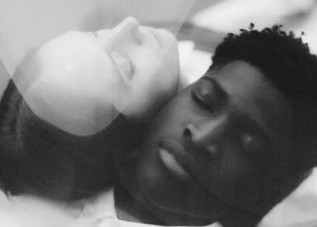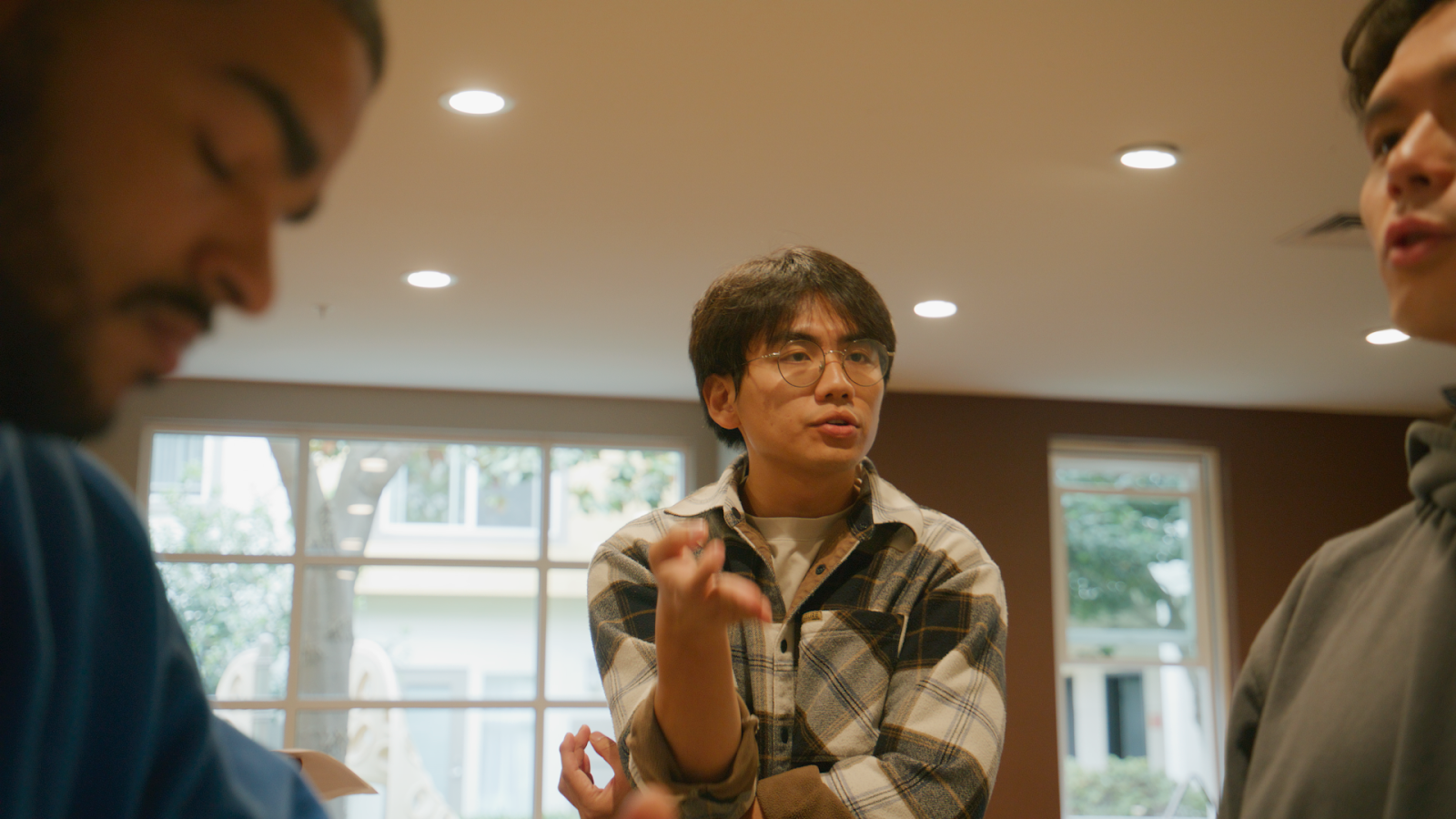Like most things that happened in 2020, the process of recording and releasing Record Setter’s second album didn’t go according to plan.
It took recording the entire album twice over for the Denton, Texas screamo band — composed of Kyle Pennington, Jacob Morrison, and siblings Judy and Jake Mitchell — to get it exactly the way they wanted it, only for the pandemic to throw a wrench in the release process.
But it’s a fitting backstory for I Owe You Nothing, a record that was in the making for over three years. While it’s not a “quarantine album” as popularized by the likes of, say, Taylor Swift and Charli XCX, it’s an album that proves Record Setter’s tenacity as one of the most exciting emo bands to emerge during the darkest year in recent history.
“We actually recorded it twice,” Judy said over Zoom from her home in Texas. “We wrapped up right as COVID was getting to the U.S. And with everything going on, everything was taking a lot longer and just up in the air way more than we anticipated. So we were sitting around with the first recordings for probably four or five months. And then we started just getting this itch to redo it.”
But the delay in schedule ended up working in Record Setter’s favor. Not long before the band had planned to release the final iteration of I Owe You Nothing, they received an email from Kevin Duquette, co-founder of Topshelf Records — a Portland-based independent label noted for bolstering early releases by emo giants like Tigers Jaw, Into It. Over It., and the World Is a Beautiful Place & I Am No Longer Afraid to Die.
A lack of touring this year has meant that Record Setter have hardly any tangible evidence that their music is now being enjoyed by more people than just the small DIY crowds that would frequent their Denton shows. Still, I Owe You Nothing has been receiving notable attention by independent blogs and Internet emo junkies since its release in November, and for good reason; it bursts with a refreshing sense of cathartic release.
Below, Popdust chatted with Record Setter about I Owe You Nothing, signing to one of their dream record labels, and the weirdest year of their lives.
Popdust: Tell me about the history of Record Setter’s formation.
Jake Mitchell: Judy and I started the band around late November 2011, just as a two-piece. We had been working with another project, but it was kind of falling apart. Judy and I were asked to play a show [in our hometown], and that was kind of our first time — we didn’t even have a name. Then I moved to Denton not long after that, but we kept trying to write remotely, while she was living in Houston with our parents at the time. And then when she moved up to Denton, we got Kyle involved.
Kyle Pennington: I just texted Jake one day after they released their first few songs. I said, “Hey, this is sick!” And I think later that day, Jake was like, “Do you play bass?” And I was like, “No.” And he said, “Do you want to?” And I was like, “OK!” So I was on bass for a little while before moving to guitar.
Popdust: What was the recording process like, especially having gone through it twice?
Judy Mitchell: The second take was a lot of fun. We had the clearest picture of what we were wanting to do then we’ve ever had before, and I think it shows for sure. Michael [Driggs, producer] is a big noise head, and we do a lot of noisy, feedback stuff, so he gets into it. That comes out too, which is really sick. The album came out way better than I could’ve ever hoped.
Jake: I think it’s really rare for a DIY band to take two swings at something like that. In its execution, it sounds really confident, in my opinion.
Popdust: In other interviews, you’ve mentioned that early on you were influenced by a lot of Christian rock bands. Then you said you used to sound like a “Joyce Manor rip-off band.” Who influenced this iteration of Record Setter?
Judy: The more I’ve written music, the more I try to write something that sounds like me. Which is not to say I don’t have influences — I definitely do. I got pretty obsessed with Loma Prieta’s Lost City. Underoath is probably the biggest influence of mine — they’re pretty much my favorite band, and I feel like this album has kind of an Underoath feel here and there. Maybe I’m the only one who thinks that.
Jake: A lot of that stuff is very foundational to why we write music. But then there’s also a lot of cross-pollination — like, Kyle comes from a lot of post-rock, indie rock background, then Jake [Morrison, bass] is still very plugged into contemporary Christian music.
KP: I knew him in middle school and he was all about ska.
Judy: Kyle’s really into Red Hot Chili Peppers.
KP: My poor first guitar teacher…I would bring in a CD of songs and just come in and say, “OK, this is what we’re learning today” every week until I eventually started teaching myself. A lot of my first learning of guitar was Red Hot Chili Peppers and Weezer almost exclusively.
Record Setter – An Explanation (lyric video)www.youtube.com
Popdust: I went to university in Denton, so I was pretty familiar with the music scene there. I was curious how being based in Denton affected your music.
Judy: Before we moved there, we were playing at this church outside of Houston. When we got to Denton, we didn’t really know what we were in for. I started messaging a ton of bands on Facebook only to find out that tons of people played in all the same bands.
We were playing one show — I don’t remember who the headliner was — but a lot of people were there to see them, and I remember thinking, “Oh sh*t, this is really different.” It was really cool, but I instantly felt like they were way out of my league. I pulled back really hard after that. I was thinking, “I’m in over my head. I can’t play like this or sing like this.” But this is when we were still writing our last record, Purge, so it pushed me to work a lot harder.
KP: But a lot of the shows back then, we weren’t even playing anything close to the music we play now. Those other local bands kind of influenced how we approached our instrument and how we write. Now, a lot of our songs aren’t just one continuous wall of sound, but it’s different parts pieced together that all independently sound different.
Popdust: I feel like in a smaller community like that, local bands have the tendency to become a hotbed of same-y music. How did you distinguish yourself?
Jake: If I’m honest, it probably comes from the fact that we’ve been playing together for eight years. It’s experience more than anything.
Judy: Yeah, I’ve been writing since I was about 15. So now, 12 years later, this album more than anything was me trying not to care about what is or isn’t hip, or whether a certain scene is gonna like it. Which is ironic, because having done that now, all these people care, which is cool! If you follow your own ear, you’ll make something better than even what you’re inspired by.
Jake: But we say that as a project who tried to force ourselves to sound like a Title Fight rip-off band. [everyone laughs]
Popdust: Do you recall that flip-switch moment of realizing what sound worked for you?
Judy: I think it happened whenever I was writing Purge; the way I was putting it together in a kind of puzzle piece way. I was playing a good chunk of it on acoustic. It was more dynamic, contrasting loud and soft, playing with open tuning. And I thought it just sounded better, and I was actually learning to play guitar better. I thought, “I should have been messing with this kind of stuff a long time ago.” I think the loud/soft thing is a pillar of our sound.
Popdust: How was the process of signing to a label during quarantine? And how does it feel now to have your name attached to Topshelf, which is such an important fixture in emo music?
Judy: It’s crazy. I’ve listened to Topshelf since I was in high school, and we also started Record Setter when I was in high school, 17 and working at Pizza Hut. I’m 27 now, so to be on that label that I sort of grew up with is pretty unreal. Especially during quarantine, I didn’t think it was going to happen. I didn’t think we were going to get signed for I Owe You Nothing, but Topshelf invited us to play at their South by Southwest Showcase this year.
Jake: Then South By got canceled, recording and mixing kind of went into limbo. Then Kevin reached out, and said, “I don’t want to be presumptuous, but I’d love to hear [the album].” They were the only label we sent it to—we didn’t shop it around. They were so enthusiastic about it. We were just like, “Why the hell wouldn’t we do this?”
Judy: And they’re all really good people there, so it was a perfect fit.
Popdust: When I was listening to the album, a lyric that jumped out to me was “I’m not emotive enough / Is this enough?” How do you think that relates to your place in the music world?
Judy: My lyrics tend to flow out without me putting much thought in them. Referring to that line, I definitely have imposter syndrome. It also relates to me not feeling “enough” in terms of gender issues. I was dealing with a lot of stress about my voice at the time. But it seems like a few people have found something in that lyric, and I’m glad. I love hearing what words make them feel or think about. My lyrics do tend to be a tad vague, and I like that people can conjure up personalized meanings for them.
Popdust: The overall emotion that I felt from this album was a sense of newfound freedom. Another lyric that stood out was, “My voice is clear for the first time in my life.”
Judy: I realized that I was trans while writing Purge. And the first half of this album dates back to right after that. Before, I felt like I had to push myself into a certain sound, and felt like I needed to sound a certain way. I would make the lyrics so cryptic and meaningless because I didn’t want anyone to know what I was singing about. I didn’t want my parents to hear anything. I was holding myself back and censoring myself. So, that line is about not caring at all about what people will think.
Popdust: What do you hope listeners take away from I Owe You Nothing?
Jake: Keep on rockin’.
Judy: I’ve actually been thinking about that a lot. I feel like if there’s a theme, it’s an idea of rumination being damaging. Constantly revisiting things, constantly revisiting moments, fake play-scripting conversations in your head that are never going to happen. All that stuff can be so destabilizing. I think that’s the big theme for me going forward.
I Owe You Nothing













